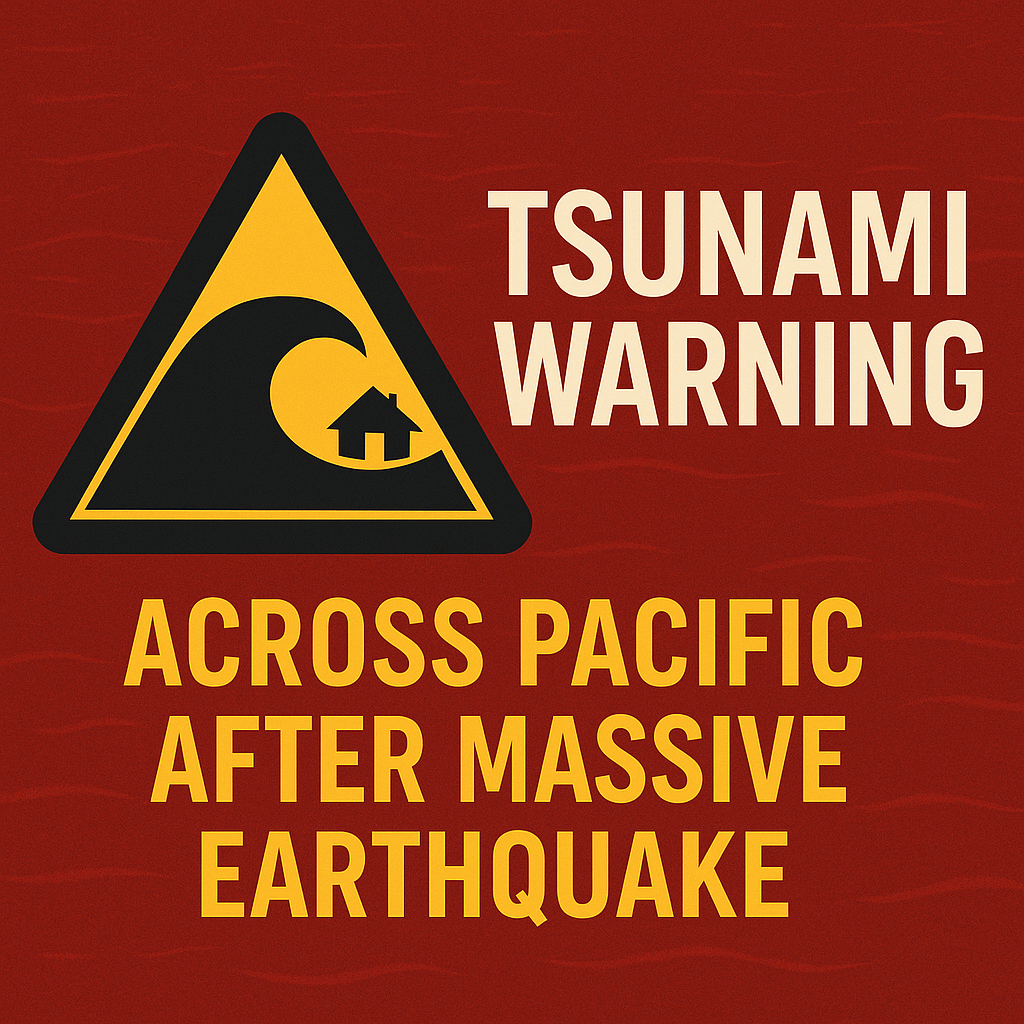Tsunami Strikes Pacific After Powerful 8.8-Magnitude Earthquake Near Russia’s Kamchatka Peninsula
Date: July 30, 2025
Location: Kamchatka Peninsula, Russia | Pacific Ocean Region
In a major tectonic event that shook the Pacific, a massive 8.8-magnitude earthquake struck near Russia’s Kamchatka Peninsula on July 29, triggering widespread tsunami alerts and evacuations across multiple countries including Japan, the United States, Canada, and Pacific island nations.
According to the U.S. Geological Survey (USGS), the earthquake struck at a depth of approximately 25 km beneath the ocean floor and generated tsunami waves up to 4 meters high along parts of the Russian coast.
🚨🚨 BREAKING NEWS 🚨🚨
— Manni (@ThadhaniManish_) July 30, 2025
USGS has upgraded the earthquake to a massive 8.7 magnitude!
The powerful quake struck off the eastern coast of Russia.
There is a serious tsunami threat.
Japan, Hawaii, and Alaska are on high alert.
Story still developing…#earthquake #tsunami pic.twitter.com/RCCBgYiGER
Regions Affected by Tsunami Alerts
- Russia (Kuril Islands, Kamchatka): Waves up to 4 meters flooded coastal towns like Severo-Kurilsk. Emergency evacuations were ordered, and several homes were damaged.
- Japan: Tsunami waves reaching up to 60 cm were observed along northern coasts. Authorities urged people to stay away from low-lying areas.
- Hawaii: Statewide sirens were triggered as tsunami waves of 3–6 feet were forecast. Several beach areas and harbors were evacuated.
- U.S. West Coast (California, Oregon, Washington, Alaska): Tsunami advisories were issued with potential wave impacts of 1–1.5 meters.
- Other Pacific Nations: Chile, Peru, Ecuador, New Zealand, Taiwan, and several Pacific Islands also activated tsunami alerts.
Eyewitness Accounts & Precautions
Residents in affected areas reported shaking buildings and emergency sirens. Videos from Hawaii showed people leaving beachside areas while coast guards advised ships to move to deeper waters.
While infrastructure damage remains limited in most areas outside of Russia, authorities warned that multiple waves may continue to strike hours after the first wave, making the situation unpredictable.
Safety Advice for Coastal Communities
- Stay away from beaches, harbors, and low-lying coastal zones.
- Follow official evacuation orders and emergency alerts.
- Do not return to affected areas until the “all clear” is given by local authorities.
- Be prepared for possible aftershocks and secondary waves.
Breaking: Massive 3 Feet Tsunami Alert for the entire Coast of Japan after a Powerful Magnitude of 8.8 Earthquake in the Coast of Russia, Japanese Manga Predictor Ryo Tatsuki The Future I Saw who predicted 2011 Quake did it again! Stay safe Japan. pic.twitter.com/oIrg48Wgrq
— David 🇦🇺🇵🇭 (@Dave2307) July 30, 2025
Understanding Tsunamis
Tsunamis are usually caused by large underwater earthquakes that displace huge volumes of water. Unlike regular waves, tsunami waves can travel at jet speeds across oceans and reach coastlines within hours, making real-time alerts critical for saving lives.
Disclaimer:
This blog post is based on publicly reported news and verified government sources as of July 30, 2025. The situation may continue to evolve, and readers are advised to monitor official emergency broadcasts and tsunami alert services in their region. The author and publisher of this post do not claim responsibility for the accuracy of third-party reports or any resulting consequences of actions taken based on this content.

